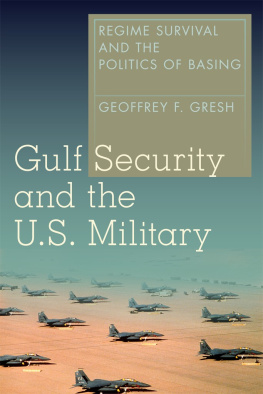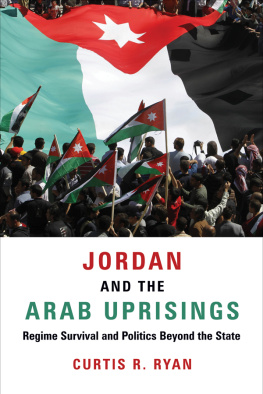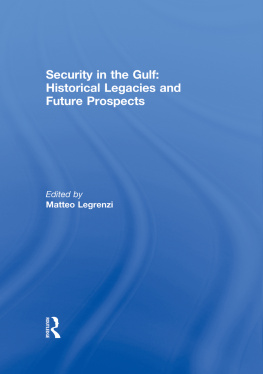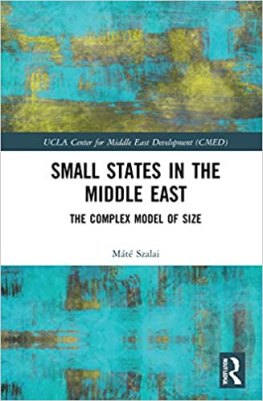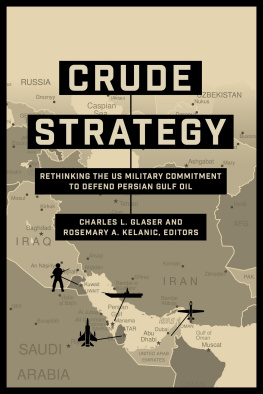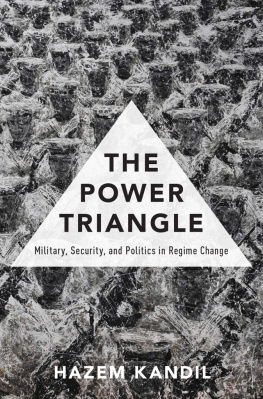Stanford University Press
Stanford, California
2015 by Geoffrey F. Gresh. All rights reserved.
No part of this book may be reproduced or transmitted in any form or by any means, electronic or mechanical, including photocopying and recording, or in any information storage or retrieval system without the prior written permission of Stanford University Press.
The views expressed in this book are those of the author and do not reflect the views of the National Defense University, the U.S. Department of Defense, or the U.S. Government.
Printed in the United States of America on acid-free, archival-quality paper
Library of Congress Cataloging-in-Publication Data
Gresh, Geoffrey F., author.
Gulf security and the U.S. military : regime survival and the politics of basing / Geoffrey F. Gresh.
pages cm.
Includes bibliographical references and index.
ISBN 978-0-8047-9420-6 (cloth : alk. paper)
1. National securityPersian Gulf States. 2. National Military bases, AmericanPersian Gulf States. 3. Military bases, AmericanPersian Gulf States. 4. Military bases, AmericanArabian Peninsula 5. Persian Gulf StatesMilitary relationsUnited States. 6. United StatesMilitary relationsPersian Gulf States. 7. Arabian PeninsulaMilitary relationsUnited States. 8. United StatesMilitary relationsArabian Peninsula. 9. Gulf Cooperation Council. I. Title.
UA832.G74 2015
355'.0330536dc23
2014036174
ISBN 978-0-8047-9506-7 (electronic)
Typeset at Stanford University Press in 10/14 Minion
Acknowledgments
This book has been a long endeavor, and I am forever grateful and indebted to my many friends, colleagues, and family members who supported me throughout. To begin, I want to express my eternal gratitude to Andrew C. Hess and John Curtis Perry of the Fletcher School of Law Diplomacy at Tufts University for their unwavering support, mentorship, and friendship. They have both enriched my life in so many meaningful ways. I would also like to thank Richard H. Shultz, Ibrahim Warde, and, in memoriam, William C. Martel and Alan M. Wachman of the Fletcher School for their support and valuable insights during the early writing and research of this project. Additionally, I am deeply grateful to Bernadette Kelley-Leccese, who championed my work from the very beginning. Countless friends and National Defense University (NDU) colleagues have assisted me in multiple ways throughout my research and writing, and to them, I am extremely thankful: Hassan Abbas, Kenneth E. Baker, Alejandra Bolanos, Matan Chorev, Ethan Corbin, Thomaz Costa, Charles B. Cushman Jr., Craig Deare, William T. Eliason, Jennifer Jefferis, Sean McFate, Jeffrey Meiser, Jay M. Parker, Rebecca Patterson, Elena Pokalova, Kyle Taylor, Peter Thompson, and David Ucko. I was also supported by several great interns during the latter stages of the book, including Griffin Dottle, Jenna Hargens, Henry Holst, Zachary Lemisch, and Clayton Thomas. Similarly, I would like to thank William Kloman for his excellent copy-editing. Also at NDU, I would like to thank Chancellor Michael Bell of the College of International Security Affairs for his strong support of this project and my research endeavors. In addition to my NDU colleagues, I would like to thank Carol Atkinson, Cindy Jebb, Daniel Lake, and Jeffrey R. Macris for their fantastic insights and critiques during various presentations and iterations of this research. I would particularly like to thank David F. Winkler of the Naval History and Heritage Command in Washington, DC, for his comments on my Bahrain chapter and for graciously lending me his personal papers and entire research collection on Bahrain. I am grateful as well to the blind reviewers for their excellent comments and insightful suggestions. And to my editor at Stanford University Press, Geoffrey Burn, and his assistant, James Holt, as well as the rest of the editorial team, thank you for the wonderful guidance and support, which has been integral to this manuscript.
I am particularly appreciative of all the excellent assistance that I received in person or from afar by the staffs of the following institutions: the U.S. National Archives and Records Administration, the William E. Mulligan Papers at Georgetown University, the Franklin D. Roosevelt Presidential Library, the Harry S. Truman Presidential Library, the Dwight D. Eisenhower Presidential Library, the John F. Kennedy Presidential Library, the Richard M. Nixon Presidential Library, the Lyndon B. Johnson Presidential Library, the Jimmy Carter Presidential Library, the Ronald Reagan Presidential Library, the African and Middle Eastern Division at the Library of Congress, the U.S. Army Center of Military History at Ft. McNair, the Naval History and Heritage Command, the British National Archives, and the Middle East Centre Archives at St. Antonys College, Oxford University.
Last, I would not have completed this book without the encouragement and love of my family. I am grateful to the Nolan family, and particularly Tony and Beth, for many years of support during numerous research and writing trips away. Thank you as well to my sisters, Kristen and Ashley, for being inspirations in all that they do to achieve deeper meaning in the world. My parents, Sean Gresh and Katherine Hoffman, deserve particular praise in their tireless enthusiasm for all my endeavors large or small, and for teaching me early on about the power of knowledge and the rewards that come with lifelong learning. My daughters, Audrey and Joan, were important sources of love, laughter, and inspiration, especially during the final push of the book. But most important, I would have never finished without the love and encouragement of my wife, Leigh Nolan. She took on many burdens over many years, including reading and offering essential insights on many drafts, and yet continued to provide endless support and good humor, which gave me motivation and strength every day. With all this, it is still important to note that any mistakes or errors found here are my own.

Map courtesy of University of Texas Libraries
IntroductionGulf National Security and the Politics of Basing
In December 2013, U.S. secretary of defense Chuck Hagel delivered a speech in Bahrain at the Manama Dialogue, a regional security summit, on the current state and future of the U.S. militarys Gulf presence. In the speech, he stated that U.S. capabilities are not in isolation of our partners capabilities. Over the last three decades, we have helped Gulf nations become some of our most capable military partners. Going forward, the Department of Defense will place even more emphasis on building the capacity of our partners in order to complement our strong military presence in the region.presence. The United States has long maintained a naval presence in Bahrain, but terminating the U.S. naval basing lease is not beyond the realm of possibility for the Khalifa family if it feels the need to end the U.S. basing presence to relieve destabilizing pressure on the monarchy. It happened in the 1970s amid internal unrest, and it could happen again today.
Although the spread of the Arab uprisings and regional violence since 2011 marks an unprecedented period for the region, the possibility of a U.S. military base eviction, or the unexpected termination of a basing lease, is a threat that has plagued U.S. government and military officials across the Middle East since World War II. The U.S. military established its first basing foothold in Saudi Arabia at the end of World War II, but in 1962 the Saud monarchy unexpectedly called for the U.S. militarys basing expulsion because of mounting internal pressures. In 1990, Saudi Arabia again permitted the U.S. military full basing access following Iraqs invasion of Kuwait, but once the United States had successfully overthrown Saddam Hussein during the Second Gulf War in 2003, Saudi Arabia terminated its basing contract in response to heightened internal security concerns and the threat posed by radical domestic extremist groups seeking to overthrow the king.


